Travel to São Paulo, Brazil
Aug 8
Arrive in São Paulo, Brazil, for an overnight stay and a welcome dinner before your group flight to Cuiabá the following morning.
 Private Trip Available
Private Trip Available Embark on this Pantanal Big Five Safari, a once-in-a-lifetime wildlife adventure in the world’s largest tropical wetland, where you’ll track jaguars, giant otters, giant anteaters, ocelots, and South American tapirs in their natural habitats. This expertly guided expedition takes you deep into the northern and southern Pantanal, exploring remote regions by boat, safari vehicle, and on foot to maximize your chances of incredible wildlife encounters. Stay in top-rated eco-lodges, cruise the legendary Cuiabá River in search of jaguars, and work alongside renowned conservation researchers for exclusive insights into the Pantanal’s unique ecosystem. Perfect for wildlife photographers, nature lovers, and adventure seekers, this immersive safari offers the best opportunity to witness rare and elusive species in their natural environment. Book your Pantanal safari tour today and experience the ultimate South American wildlife adventure!
⭐⭐⭐⭐⭐ “The Pantanal is an amazing area! We were able to view all of the big 5–jaguar, ocelot, tapir, giant anteater, giant otter—many of them multiple times. We saw other wonderful animals and hundreds of beautiful birds. Our guide, was the best guide I’ve ever had on a trip!” – Nancy Frank |
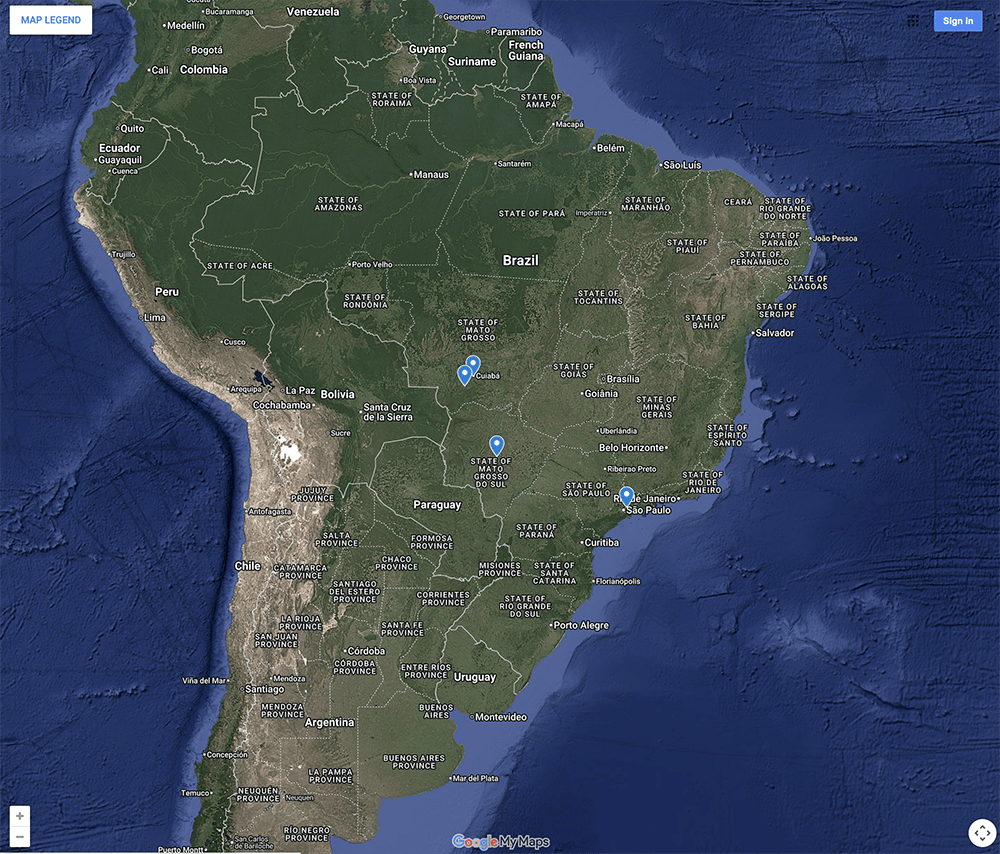
Itinerary Updated: May 2025
| Date | Description | Lodge | Meals |
|---|---|---|---|
| Aug 8 | Arrival in São Paulo. Land in Brazil and meet your group for a welcome dinner. | Hotel Panamby Guarulhos, Guarulhos | D |
| Aug 9 | Fly to Cuiabá & Drive the Transpantaneira. Travel to the northern Pantanal and settle into Araras Eco Lodge. | Araras Eco Lodge, Northern Pantanal | B, D |
| Aug 10 | Explore Araras Wetlands. Enjoy safaris and birdwatching in this wildlife-rich region | Araras Eco Lodge, Northern Pantanal | B, L, D |
| Aug 11 | Scenic Drive to Porto Jofre. Morning game drive at Araras, then travel deeper into the Pantanal, stopping for wildlife along the way. | Hotel Pantanal Norte, Porto Jofre | B, L, D |
| Aug 12-15 | Jaguar Tracking on the Cuiabá River. Boat safaris to observe jaguars, giant otters, monkeys, and birds. | Hotel Pantanal Norte, Porto Jofre | B, L, D |
| Aug 16 | Fly to Southern Pantanal. Morning boat ride then depart by charter flight to the secluded Pousada Aguapé. | Pousada Aguapé Lodge, Southern Pantanal | B, L, D |
| Aug 17 | Conservation & Wildlife Studies. Join local researchers and explore diverse habitats. | Pousada Aguapé Lodge, Southern Pantanal | B, L, D |
| Aug 18 | Travel to Fazenda San Francisco. Observe unique ecosystems on a scenic drive. | Fazenda San Francisco, Southern Pantanal | B, L, D |
| Aug 19 | Nocturnal Wildlife Safari. Spot anteaters, ocelots, and rare mammals on night drives. | Fazenda San Francisco, Southern Pantanal | B, L, D |
| Aug 20 | Travel to Caiman Lodge. Search for wildlife in the morning then transfer to one of the Pantanal’s premier wildlife lodges. | Caiman Lodge, Southern Pantanal | B, L, D |
| Aug 21-22 | Wildlife Safaris at Caiman Lodge. Explore pristine habitats and search for elusive predators and giant anteaters. | Caiman Lodge, Southern Pantanal | B, L, D |
| Aug 23 | Final Safari & Transfer to Campo Grande. Enjoy a last morning game drive before traveling to the city. | Hotel Deville Prime, Campo Grande | B, L, D |
| Aug 24 | Return to São Paulo & Depart. Fly back to São Paulo to connect with your international flights home. | B | |
| Aug 25 | Arrive Home. |
Rafael studied Environmental Management, specializing in Tourism, the Environment, and Social Responsibility. He began his work as a naturalist guide in 2013 throughout the Amazon and Pantanal, later becoming the head of guides for the Pantanal’s Caiman Lodge. He enjoys sharing his knowledge and passion for nature and wildlife with travelers while also integrating the local communities and the importance of respecting the environment.
Arrive in São Paulo, Brazil, for an overnight stay and a welcome dinner before your group flight to Cuiabá the following morning.
Transfer to the São Paulo Airport for the group flight to Cuiabá, the vibrant gateway to northern Mato Grosso. Upon arrival, embark on a scenic drive through 56 miles of the breathtaking Cerrado region, known as the Brazilian savanna, en route to the charming town of Poconé. Continue your adventure by traveling 26 miles south to the iconic Transpantaneira Highway – a legendary gravel road stretching 93 miles through the heart of the Pantanal, the world’s largest tropical wetland. Head south along the Transpantaneira to reach your destination of Araras.
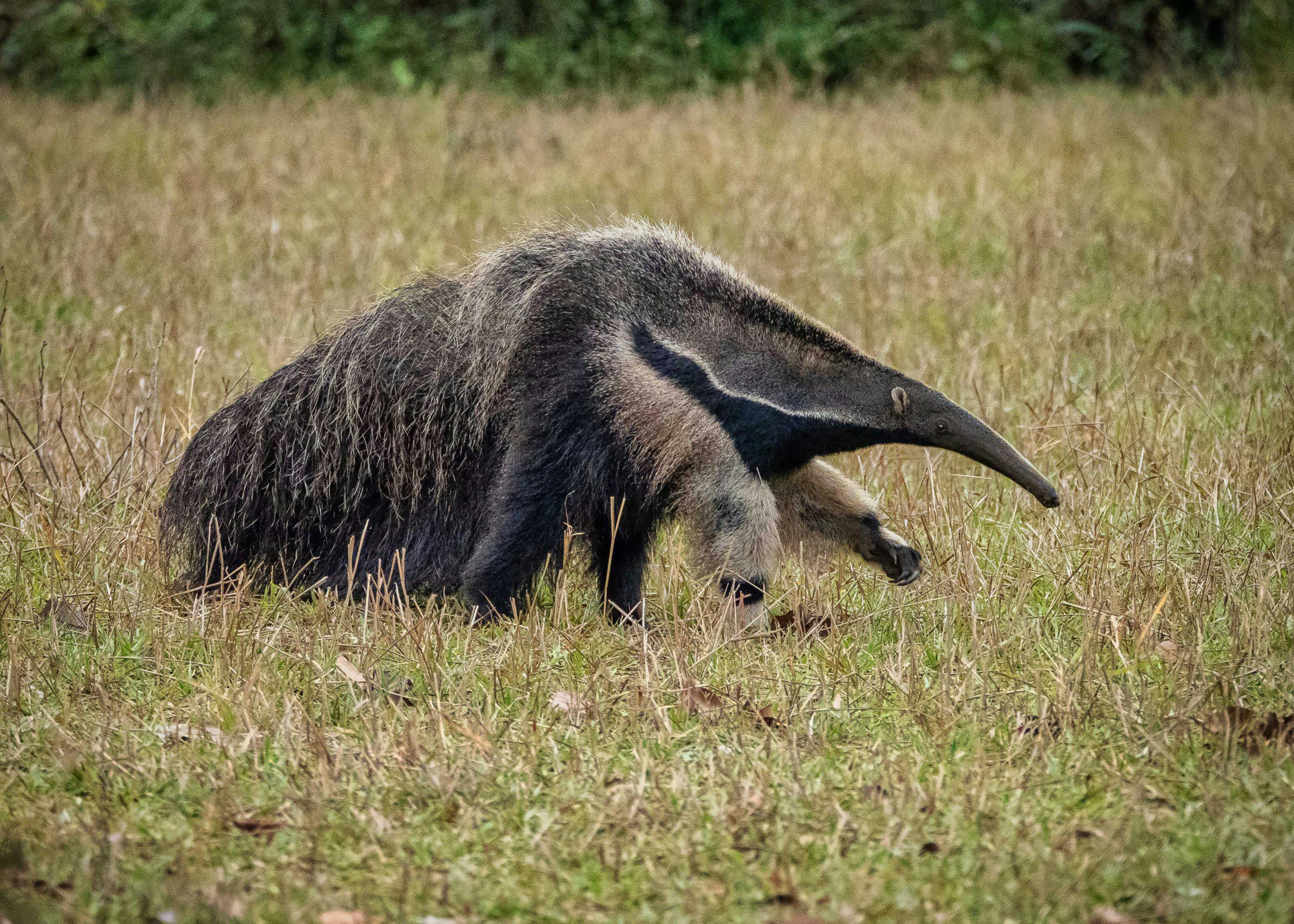
Immerse yourself in the natural beauty of Araras Eco Lodge, spanning an impressive 7,413 hectares of diverse habitats, including wetland, forest, and savannah. Explore the lodge grounds and elevated boardwalks to spot incredible birdlife, such as Cinereous-breasted Spinetails and Mato Grosso Antbirds, thriving in the lush woodlands. Venture east of the Transpantaneira Highway into the expansive dry grasslands, where you’ll have exceptional opportunities to observe both lesser and giant anteaters in their natural environment. After a delicious dinner, embark on an exhilarating night drive – the optimal time to encounter the elusive tamandua (lesser anteater) and, with some luck, a South American tapir.
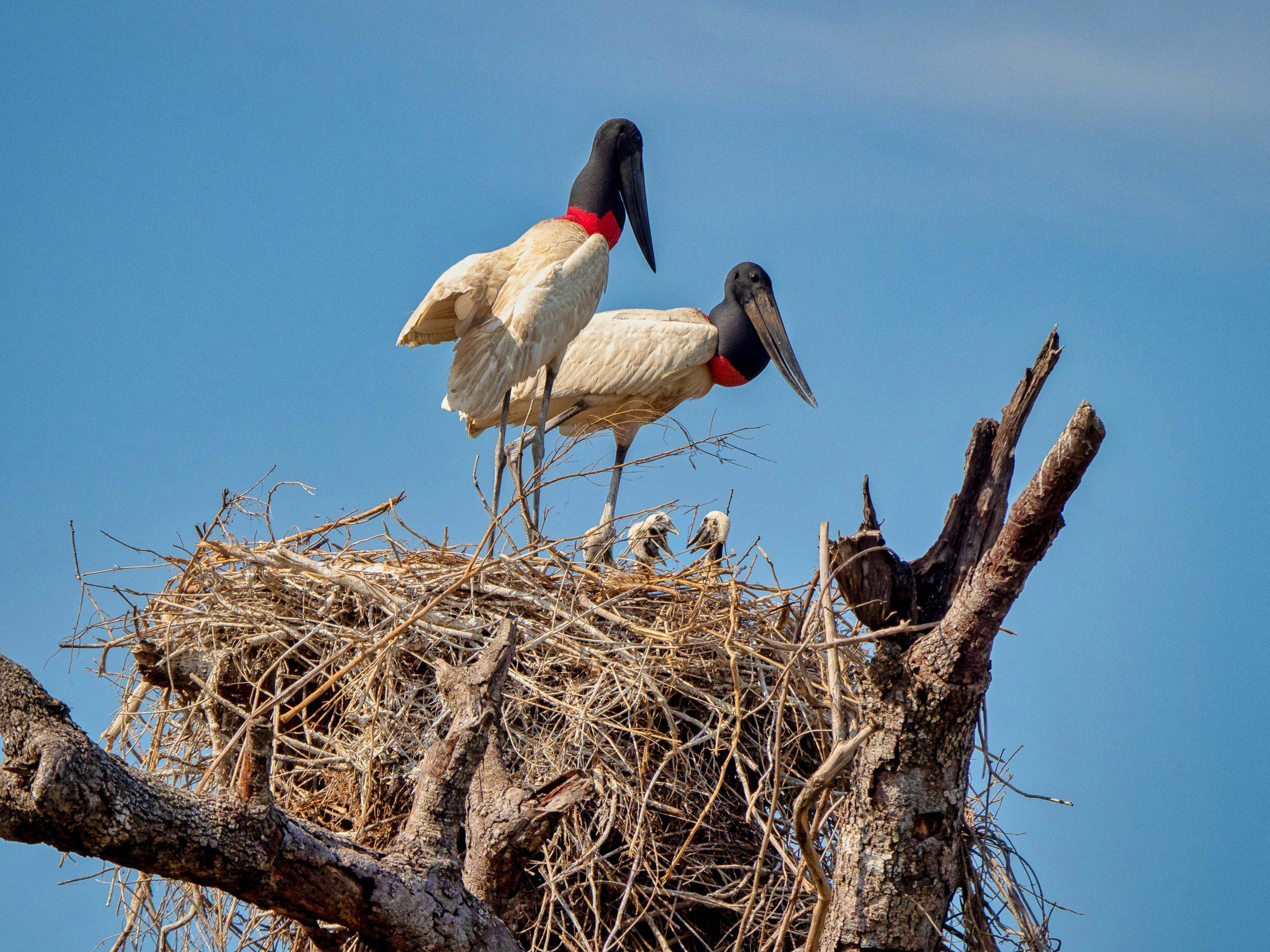
Kickstart your day with an exhilarating early morning safari at Araras Eco Lodge before journeying south along the Transpantaneira Highway to the Cuiabá River in Porto Jofre. Along this legendary route, water accumulates beside the highway, attracting an impressive array of wildlife. Take advantage of scenic stops to stretch your legs, capture breathtaking photographs, and immerse yourself in the beauty of the Pantanal.
Spot the majestic Jabiru Stork, a towering five-foot-tall emblem of the Pantanal, and the stunning Hyacinth Macaw, the world's largest parrot, often seen around lodges as they feast on palm seeds. As you traverse the lush landscapes, keep an eye out for two species of brocket deer, along with pampas and marsh deer, roaming the tall grasslands.
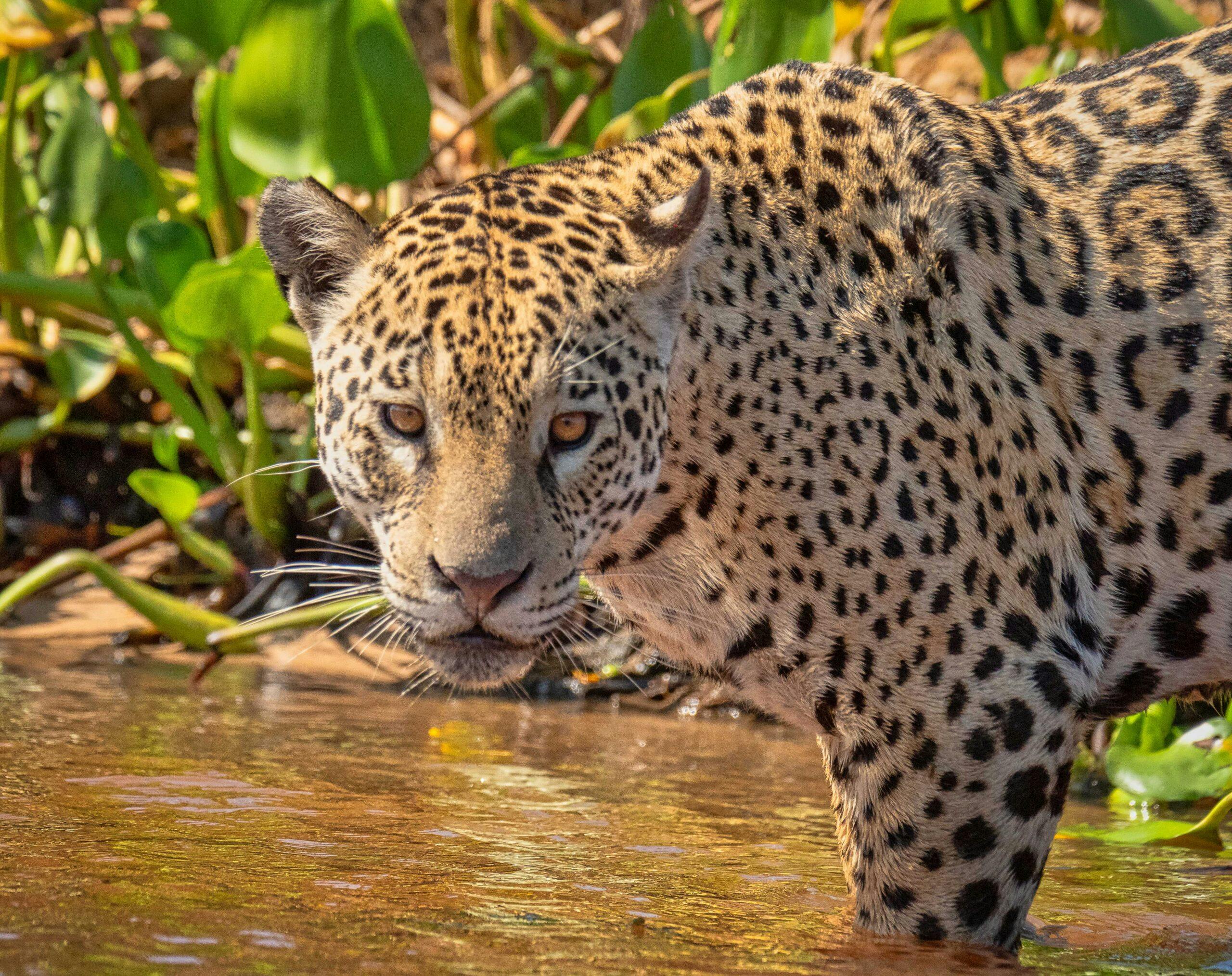
The Rio Cuiabá offers some of the best opportunities to spot jaguars in the wild. Protected in this region, these magnificent jaguars have grown accustomed to the presence of boats filled with eager wildlife photographers. You'll travel in nimble boats, perfectly suited to navigate the river’s winding tributaries, where jaguars may be resting along the banks or stealthily hunting.
Each day, enjoy private boat excursions in the cooler hours of the morning and late afternoon when wildlife is most active. Beyond the stunning birdlife, keep watch for fascinating mammals like black-striped tufted capuchins, crab-eating foxes, South American tapirs, and the elusive ocelot. The Pantanal’s waterways are also home to an incredible array of reptiles, from hundreds of Yacaré caimans to green iguanas, and if luck is on your side, the rarely seen yellow anaconda.
Take a final morning boat excursion before your charter flight to Pousada Aguapé, a remote eco-ranch rich in biodiversity.
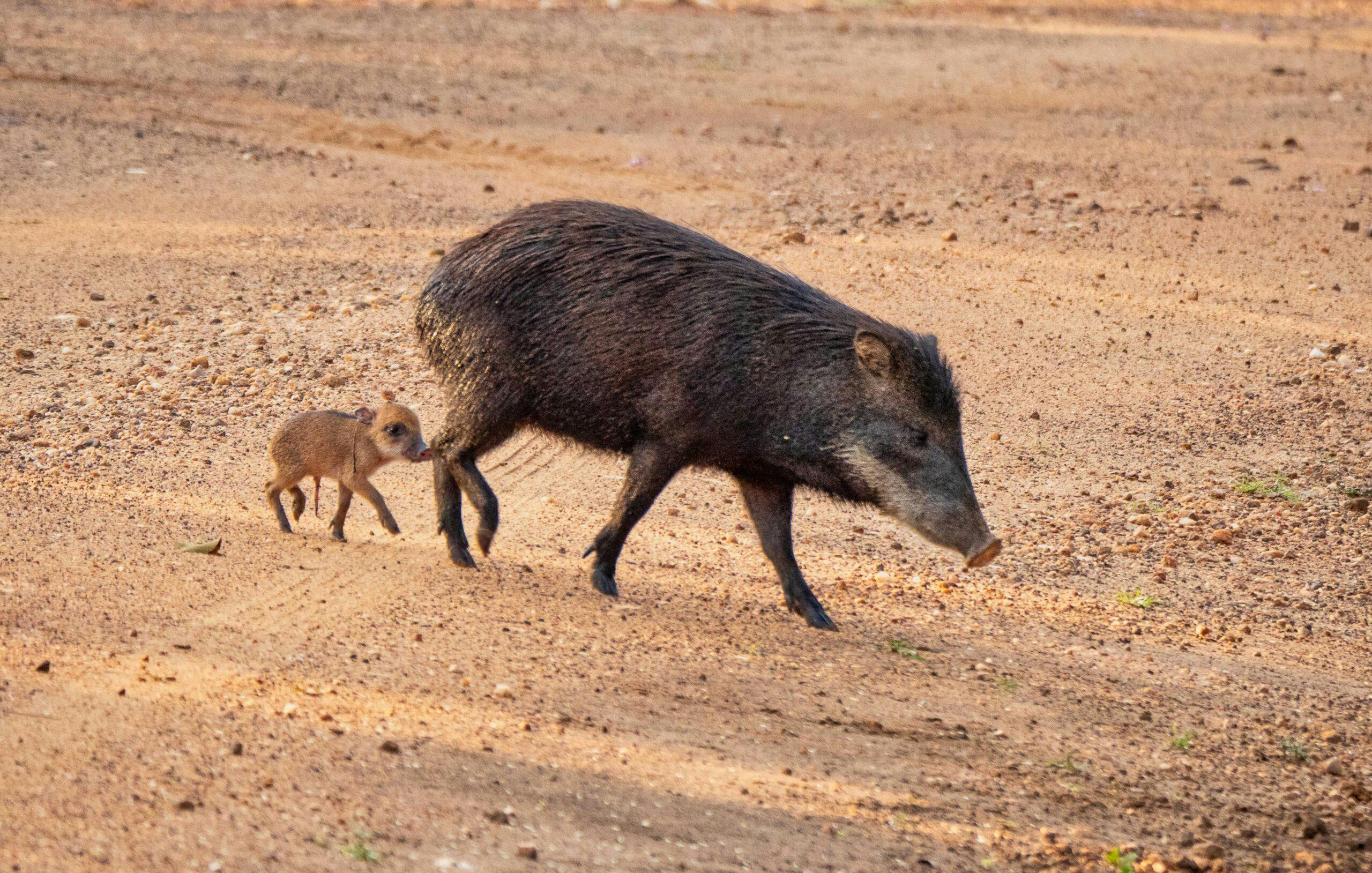
Located near Pousada Aguapé, the Peccary Project (Projeto Queixada) is a groundbreaking conservation initiative dedicated to protecting the rich biodiversity of the Pantanal. Through strong partnerships with the local rural community, this project promotes sustainable practices that have significantly contributed to the
area’s remarkable wildlife diversity. During your visit, you’ll have the unique opportunity to meet passionate local researchers who will guide you through their ongoing conservation efforts. Learn firsthand about their vital work to protect the critically endangered, white-lipped peccary and discover how sustainable ranching practices help maintain the balance of this unique ecosystem
Continue your wildlife search before heading to Fazenda San Francisco, a renowned conservation-focused ranch and eco-lodge in the Southern Pantanal.
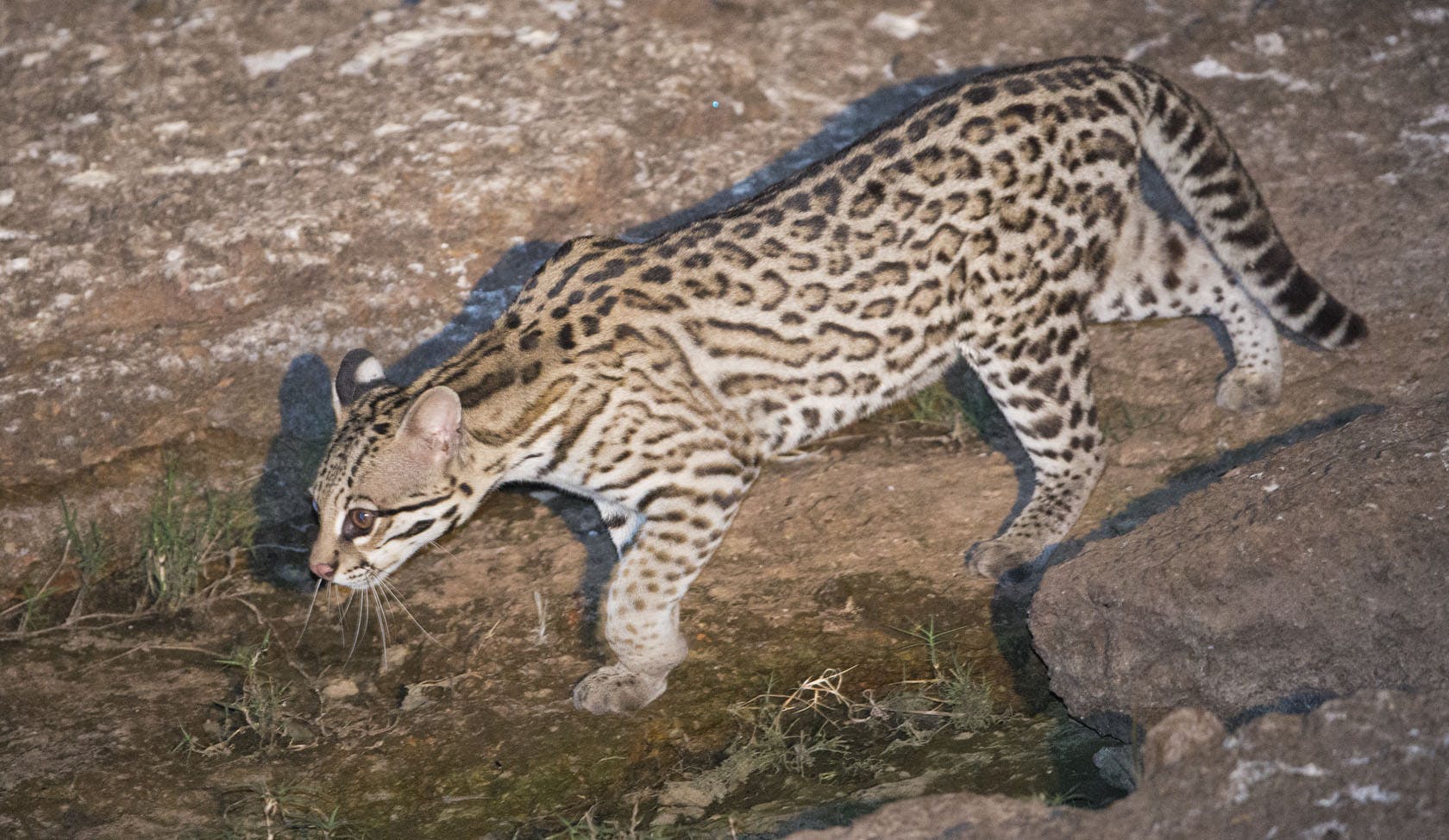
© Cheesemans’ Ecology Safaris
At Fazenda San Francisco, your chances of spotting iconic wildlife like giant anteaters and ocelots are unparalleled, with thrilling game drives and night spotting excursions offering prime opportunities. With a bit of luck, you may even encounter jaguar, maned wolf, or South American tapir. This remarkable destination spans extensive native forest, wetlands, and grasslands, while also functioning as a working ranch with cattle pastures and expansive rice fields. The dedicated owner and staff are committed to preserving wildlife, with a special focus on protecting rare mammals. Right around the lodge, you'll find an abundance of Blue-and-yellow Macaws, parrots, parakeets, toucans, and toucanets, all well-habituated and perfect for up-close encounters. Enjoy evening and dawn game drives for the most exciting wildlife action, while taking relaxing breaks on the lodge grounds during the warmer parts of the day.
Enjoy an early morning game drive before traveling to the famous Caiman Lodge.
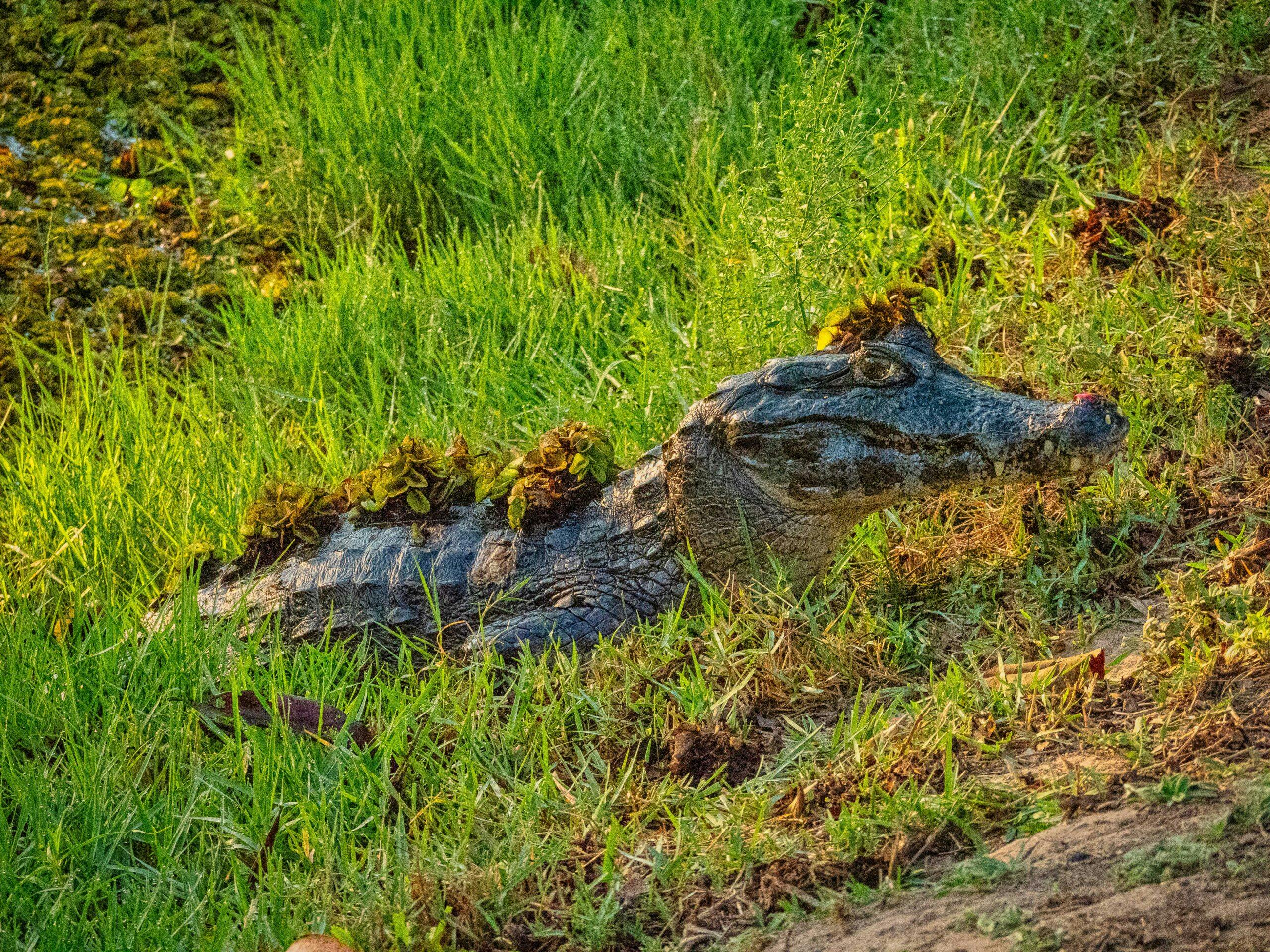
Caiman Lodge, the best of the best of nature lodges in South America, has charming accommodations, a very experienced friendly staff, delicious food, and very high-quality service. Most importantly, Caiman Lodge is a wildlife lover’s paradise, making it our absolute favorite spot in the entire region. You have good chances for locating jaguars, but the overall wildlife experience while immersed in this beautiful native habitat is the highlight here at Caiman, named for the plethora of Yacaré caimans whose glowing eyes dot the landscape after dark. Caiman Lodge offers exceptional opportunities to encounter rare and fascinating wildlife, including mother giant anteaters carrying their young, graceful gray brocket deer, pampas deer, two species of armadillos, the elusive tapeti (Brazilian rabbit), and curious crab-eating raccoons. You’ll also experience night drives to spot nocturnal wildlife in action. Capturing elusive wildlife on camera can be challenging, but with ample time spent in nature and the expert guidance of the lodge staff, you’ll maximize your chances of taking home spectacular images from your unforgettable journey.
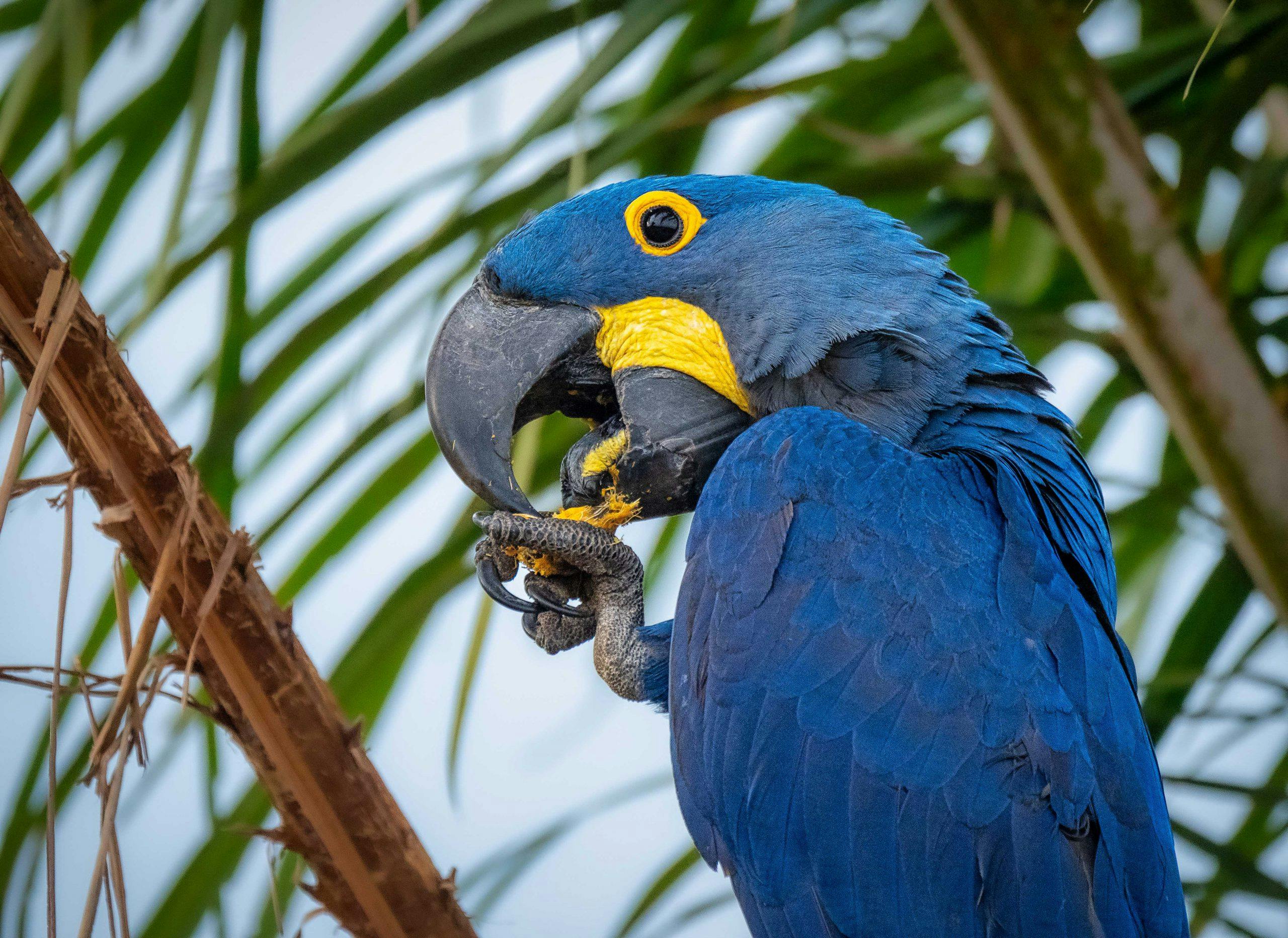
Spend your final morning at Caiman Lodge, capturing stunning images of resident macaws and other wildlife before departing for Campo Grande
Fly from Campo Grande to São Paulo, where you’ll connect with your international flight home.
Arrive home with unforgettable memories and spectacular wildlife photographs from the ultimate Pantanal safari adventure.
| Type | Cost Per Person |
|---|---|
| Trip Cost, double occupancy | $15,500 |
| Single Supplement | Contact Us |
Share the Experience – Earn Travel Credit
Know someone who would love this trip? Refer a friend and you’ll both benefit—you get credit toward a future adventure, and they receive a discount on their first trip with us. See how our Referral Program works ›
Costs are per person, double occupancy, not including airfare (except for three internal flights), singles extra. See Included and Not Included sections for more details.
If you are a single traveler, we will try to find a roommate for you, but if we cannot pair you with a roommate, we may charge you a single supplement. Single rooms cost extra and are subject to availability.
| Payment | Due Date | Amount Per Person |
|---|---|---|
| Deposit | Due now to reserve your space | $500 |
| Final | March 1, 2026 | Remaining balance |
Payments are due based on the schedule above. All reservations require a deposit to confirm reservation of your space.
Until the Final Payment due date, deposits are refundable except for a cancellation fee of $150 per person, which can be applied toward another trip if reserved within six months of the cancelled trip’s departure date. Cancellations are non-transferrable. No refunds are given after the Final Payment due date.
The Pantanal can be very hot, from 90 to 100+°F (32 to 38+°C), especially during midday and afternoons. The occasional cold snap may blow through, dropping the temperature to the 60s°F (~15 to 20°C), so layer clothes to manage these changing conditions!
Most wildlife viewing is done from small boats and vehicles. Walks to search for wildlife are generally less than an hour over relatively flat trails or along gravel roads. Please contact us if you have any health concerns that may make this trip challenging.
Detailed logistical information is included in the Trip Planning Materials we will send you.
Flights you book
Flights we book
While the Amazon is much more famous, the Pantanal is the best place to see Brazil’s wildlife as it has much greater biodiversity and a higher density of that biodiversity. The Pantanal is the world’s largest wetland and therefore attracts many large mammals (the Big Five), smaller mammals such as monkeys and capybaras, and many beautiful birds
We visit in July through September during the dry season when wildlife tends to concentrate around the ponds left after the wet season’s floods. Fields are now dry, enabling us to hike and drive safari-style through them to look for wildlife. It is also warmer during these months, and the coolness of the river entices jaguars to the riverbanks to cool off. July through September are also good months to see plentiful birds.
Our goal is to see the Big Five, but we cannot guarantee that we will see them all as wildlife is wild and unpredictable! But to best meet our goal, we spend the maximum time in nature to greatly increase our chance of seeing the Big Five and lots more.
During days near the Cuiabá and other rivers, we spend a lot of time in boats, as it is the best way to see jaguars and other wildlife. Wildlife is accustomed to tourist boats and feels safe around them, generally allowing us to approach to watch and photograph them.
The rivers in this region are calm and we have never had problems with anyone getting seasick.
All lodges have private baths and air conditioning.
Don’t let a fear of motion sickness keep you away! Even those who have experienced motion sickness reported that the incredible wildlife and overall experience were well worth the temporary discomfort. If you are susceptible to motion sickness from bumpy roads, small boat rides, or are concerned that you might be, please come prepared! The key to avoiding motion sickness is to act before you experience nausea. Do your own research and consult your doctor before taking any medications. A good night of sleep, eating well, limiting alcohol, and using your favorite seasickness remedy is sufficient for most travelers. Find more information on our Coping with Seasickness webpage (this information is applicable to any form of motion sickness) and contact us if you have any questions.
You will travel by air-conditioned private bus, boat, and commercial air. Some remote roads in the Pantanal are unpaved, dusty, and bumpy. Some of the drives between regions are long, between one and five hours, but most of these are on paved, modern roads. The boats are comfortable (the seats have backrests) and are easy to get in and out of. Although the boats have limited space, you have room for your daypack and camera gear near your feet and on your lap.
Our company ethos has always regarded conservation as inseparable from responsible tourism. We struggle with the dilemma that traveling worldwide expends climate-changing carbon. However, we wholeheartedly believe that traveling with us will cultivate your passion for conserving our beautiful world while stimulating each destination’s local economy. We encourage you to explore the various ways in which Cheesemans’ operates within this context:
Read our current Terms and Conditions.
 Rafael Andrade
Rafael Andrade